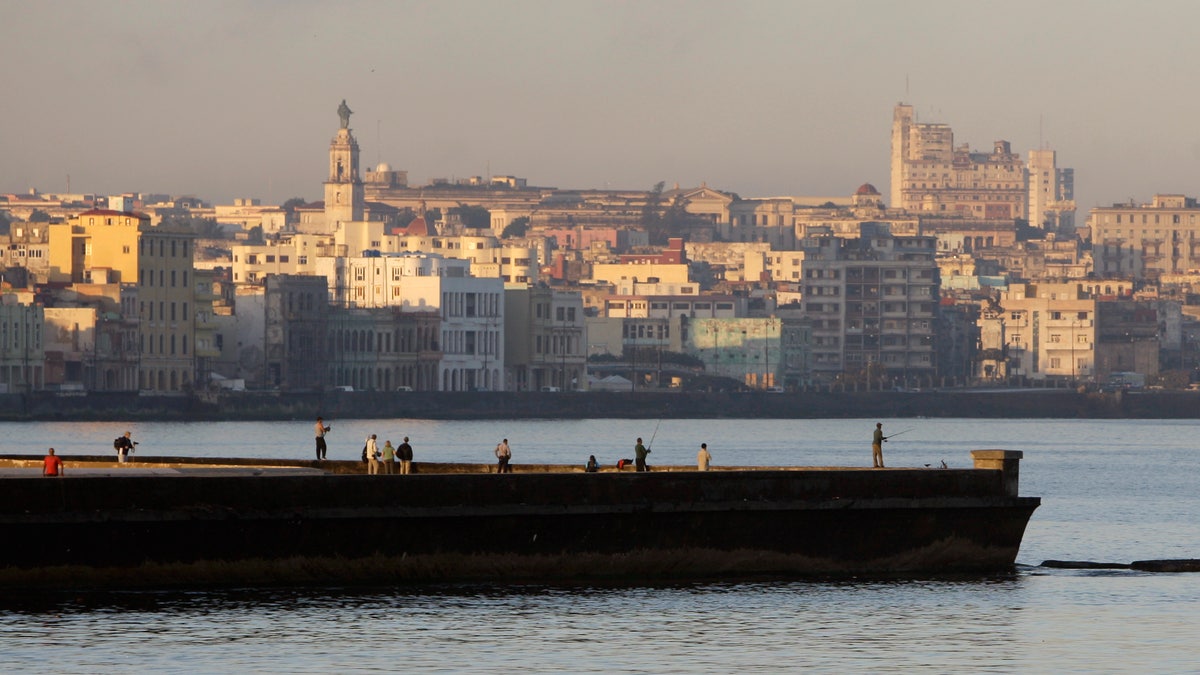
People fish from a dock in Havana Bay, Cuba, Tuesday Feb. 7, 2012. (AP Photo/Franklin Reyes) (AP2012)
It is something you just don't hear anywhere else in the United States, especially Florida: Tampa wants to trade with Cuba.
Irrespective of the antagonistic politics involved between the United States and Havana, this is all about economics.
"It is about jobs, and it is about money," says Tampa City Council Chairman Charlie Miranda.
"I can tell you, the Cuban people are warm and friendly," says Stephen Michelini, of the World Trade Center Tampa Bay. Michelini just returned from another trade mission to Cuba, meeting with Communist government leaders and Cuba's Chamber of Commerce President.
Budget Travel: Discovering San Juan
Michelini and others are aggressively setting up Tampa Bay to be "The Gateway to Cuba" -- the kind of talk that is politically forbidden in anti-Castro Miami.
“We’re actively marketing in the Cuban governmental agencies to position Tampa so that when the U.S. side changes the regulations, we’ll be in a principal position," says Michelini.
Under the U.S. embargo rules that apply to Cuba, the only trade that is currently legal is agriculture and medical. Much of those shipments south leave the U.S. through the Port of Tampa.
But Tampa Bay leaders are establishing an economic pipeline to the communist island, primarily important person-to-person contacts, which they hope will soon be tapped into a gusher of millions of dollars.
Tampa's Council, Chamber of Commerce, Port of Tampa leaders, U.S. Representative and substantial Cuban-American population are closely following Raúl Castro's recent liberalizations of Cuban society and the explosion of travel to Cuba under the Obama Administration.
Where under President Bush, Cuban-Americans could only visit relatives in Cuba once every 3 years, today Cuban-Americans can visit the island as often as they can.
And the demand for seats on charter planes to Havana is surging.
Miami leads the country, with about 60 Cuba-bound charter flights a week. Tampa is now the No. 2 U.S. city for Cuban charter flights, with four a week.
Demand in Tampa has been so great, the President of the Chamber says airlines have had to stagger the number of people per flight to make room for all of the gifts and goods they are taking with them.
The only ways for Americans without family connections to travel to Cuba right now are either via universities and museums offering "cultural exchange trips," or illegally sneaking into Cuba through a third country.
But Tampa's Council Chairman believes things are going to change within five years.
The Tampa City Council has sent a friendly greeting to the President of Cuba's National Assembly and invited Cuban diplomats to visit Tampa businesses.
The Port Authority recently held a business seminar on potential trade opportunities. And Tampa-based Democratic Congresswoman Kathy Castor now champions lifting most if not all restrictions.
In a statement released to Fox News, "Our aim is to create jobs for our small-business owners in historic Ybor City, West Tampa and throughout our community."
Ybor City, northeast of downtown Tampa, was rolling cigars with Cuban tobacco and trading with Cuba long before South Florida and Miami was drained of swamp and developed.
It was in Ybor City that Cuba's José Martí championed independence for the island, and a statue of Martí still stands.
Arthur Savage, President of AR Savage, a longtime family shipping business, not only hopes to tap into Tampa's historic relationship with Cuba, but like other business and political leaders, make Cubans in the near future think of Tampa first, not Miami, or any other U.S. port.
"We think that it would be an economic boom to the region if we could once again help Cuba, in rebuilding it and supplying it, with the material and everything that it needs to get its country back," Savage says. "With the economic downturn that it is, I think everybody ought to be looking at every trade opportunity that there is."
The question of when, exactly, those Cuba trade opportunities open up, depends almost entirely on the Cuban dictatorship, unless U.S. policy unexpectedly changes.
According to the supporters of the U.S. Cuba Embargo, it stays in place until Cuba holds legitimate free and open elections, frees political prisoners and prioritizes human rights.
In the meantime, Tampa Bay is more than delicately getting ready.
Phil Keating is national correspondent for Fox News Channel out of the Miami bureau.
Follow us on twitter.com/foxnewslatino
Like us at facebook.com/foxnewslatino
